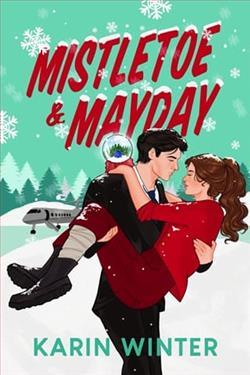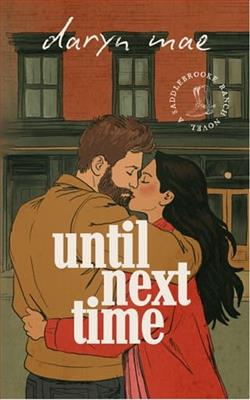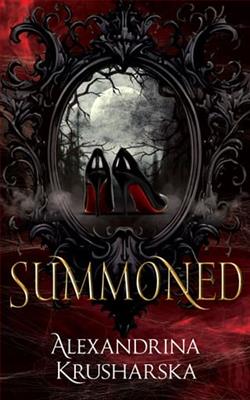Page 15 of A Stroke of Luck
Hell and damnation!No matter which way he turned, it seemed he ended being a sad disappointment to everyone he encountered.
The wave that washed over him now was not one of sizzling passion but maudlin self-pity. There was not an adventurous bone in his body. He didn’t want his hands dirtied or his boots scuffed. In fact, he was sorry he had ever strayed from the opulent comforts of his London townhouse, sorry he had ever caved in to the wheedling pleas of his mother’s family, sorry he had agreed to use his ducal influence to help straighten out his rackety uncle’s twisted affairs, sorry that he had ever met such a disconcerting clan as the Greeleys.
Sorry, sorry, sorry.
Oh yes, he was a sorry fellow indeed.
And here shehad thought that their august sovereign George III was the only mad monarch in the realm.Ha!Zara gathered up a brick of peat and let it drop into the barrow with a satisfying squish. If all titled English gentlemen were as queer in the attic as the King of Spades, she was heartily glad she had never been introduced to the drawing rooms of London Society.
She considered herself a fairly shrewd judge of character. Her eye for detail, sharpened over the years by her study of art, had been honed to a fine point by the need to survive. It allowed her to penetrate the veneer of polished smiles and practicedcompliments and detect the tiny flaws and hairline cracks that went unnoticed by most other people. But the dratted duke remained cloaked in mystery, despite her attempts to strip away the layers of contradictions surrounding him.
No amount of salt or seaweed could disguise the elegant cut of his clothing or the costliness of their materials. That alone would have given notice of his being a Gentleman of Quality. Yet even without the fine tailoring dressing his person, there was natural aristocratic bearing about him that made it obvious he had been born to a life of power and privilege. So how to explain the unspoken bond of friendship between the duke and his disabled valet? Even an unsophisticated country miss knew that it was nothing short of extraordinary for a gentleman to allow a servant to behave as an equal.
A muttered growl from the duke caused her brow to furrow. His snippy whining and preening manners bespoke a pampered aristocrat. But along with the sulky sentiments, he had shown hints of having a dry sense of humor. And beneath the surface glare of disgruntled disapproval in his eyes, she had also caught glimpses of deeper, far more complex emotions than mere pique.
Unless she was terribly mistaken, The Duke of Prestwick was far more thoughtful and intelligent than he appeared. Why, she wondered, did he wish to keep such qualities hidden away?
Another slanted glance in his direction showed that he had begun to master the rhythm of shoveling. His boot drove in the blade with authority and a flick of his wrists drew it in a sharp line through the spongy peat, cutting out neat block at nearly the same pace as Nonny. Zara found she couldn’t help watching his long, lithe fingers in action. There was nothing indolent or lazy about their graceful movement. Surely they were used for something more meaningful than knotting his cravat in a Trone d’Amour or Mathematical.
Almost of its own accord, a blunt question slipped out from her lips. “You have unusual hands. Pray, where did you acquire such a dexterous touch?”
The tip of the spade hovered in mid-air for a moment, then slowly lowered to earth. “I play the pianoforte.” His expression seemed to challenge her to laugh.
Music?Although she possessed only a rudimentary talent of her own, she admired all forms of the art, from the stirring chords of a symphony to the lilting notes of a sonata. “What sort of music do you favor?” she asked, the lump of sod in her hands forgotten. “The harmonious precision of Haydn? The cerebral symmetry of Mozart? Or the more untamed emotions of Beethoven?”
He looked at her as if she had been speaking in Cantonese. “Y—you are familiar with the nuances of such composers?”
“You may find it difficult to countenance, sir, but we were not raised as wild savages,” she replied tartly.
“I—I meant no offense. It’s just that it is rare to encounter anyone who actually knows the difference between a fugue and a fandango.”
“Surely even someone tone deaf could differentiate between those two,” quipped Zara with a faint smile.
“You would be surprised.” She was gratified to note that his voice held the same dry note of humor as her own. “I have friends—intelligent friends—who would swear that an aria from Verdi’sRigolettocould be sung by the chickens in a barnyard.”
The wry comment actually made her laugh. “Well, I do not claim to understand the nuances of opera, sir, but I am tolerably well-versed in the works of the German composers, for I prefer their works above all others.”
“Indeed?” Again, his expression betrayed how unexpected her words were. But mingled with the surprise was an unmistakable enthusiasm that, in an instant, transformed hiswhole face. His jaw relaxed, his eyes lightened and his mouth was no longer set in a grim line. “I, too, feel they have been creating the most interesting compositions, at least for the past half-century. One must, of course, give Haydn credit for his profound influences on modern music. He changed the way we listen to symphonies by bringing a certain order to chaos. However, I find I prefer the unbridled emotion of Beethoven. though, to be sure, he is not to everyone’s taste.”
“Oh, how can one not respond to such a powerful expression of feeling? His music is so individual, so poetic!” Finding it impossible to contain her own enthusiasm on the subject, she rushed on. “As for Haydn, you are not of the same opinion as Goethe, who said that his works are the ideal language of truth …”
Swept up in the exchange of ideas, Zara was unaware of how long the discussion had lasted until Perry tapped her on the elbow. Looking up, she saw that Nonny was leaning on his spade, regarding her with a quizzical look, while her younger brother was trying to steady the mountain of peat that was now looming above the sides of the barrow.
“Come, why are we all standing around wasting time?” she snapped brusquely, brought back to earth by the sight of the precarious pile. Disappointment at having the lively interchange of ideas come so suddenly to an end caused her tone to turn more brittle. “We can’t afford to dally in idle conversation, not if we are to get the job done. Stump, perhaps you could take one handle and help me wheel the barrow to the shed while Perry takes your place tracing out more bricks of the peat.”
“It is my fault for distracting you,” murmured the duke. His spade flashed through the air. “Here, let me get back to work.”
Distracting, indeed!Zara found herself watching the play of taut muscle through the thin fabric of his shirt. The show of strength was a subtle rippling rather than a beefy flex, andonce again she realized that the appearance of his lithe frame, like much about the rest of him, deceptive—it was not nearly so undeveloped as she had supposed at first.
“Don’t be dallying, Nonny,” she said, though the mumbled rebuke was meant more for herself than her sibling. Ducking her head, she grabbed hold of the barrow handles as if they might afford her some grip on her wayward thoughts. As if in concert with such sentiments, a warning note reverberated in her head. What in the name of Hades was she doing, discussing such dangerous topics as passion and emotion with a total stranger?
Zara Greeley was pragmatic, not passionate, she sighed. She really couldn’t afford to be anything else, not with all the responsibilities that had fallen upon her shoulders. With an inward sigh and a heave of her knees, she helped the duke’s valet set the wooden wheel to bouncing over the mud and rocks.
Clack, clack, clack.
The staccato sounds were a loud reminder of the down-to-earth reality of her situation. Still, at times, she couldn’t help indulging in a symphony of girlish fantasies—what it would be like to dance to the heady melody of a Viennese waltz, to wear frothy silk ball gowns and smile at smitten suitors.
If.If her father had possessed a modicum of common sense to go along with his adventurous spirit. If her grandmother had not been a spiteful dragon. If her distant relatives had not ignored her urgent appeals …















